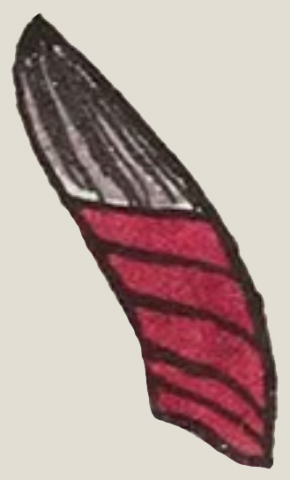tzontli (Mdz48r)
This logogram for a bundle of hair (tzontli) has been carved from the compound glyph for Tochtzonco. The element here shows a sizable lock of hair (purplish) wrapped with perhaps a red leather strip or the red tie called the tochacatl, which was cord-like.
Stephanie Wood
The term tzontli can refer to a head or a full head of hair, but many times in glyphic representations, it is a thick lock or clump of hair, either wrapped, tied at the base, or held in a human hand, such as can be seen in the attestations included in the Tetlacuilolli.
The sign for tzontli can sometimes appear similar to bundles of blades of grass (zacatl) given as tribute payments. Four hundred hairs or pieces of grass would be centzontli (the number 400, or a single or entire tzontli). Some hair binders had feathers attached to them, such as the tlalpiloni. Warriors often wore their hair bound, as part a style referred to as the temillotl. But singers would tie their hair and attach feathers to it as we see in the Florentine Codex. A similar red leather tie is called a "cinta de cuero rojo," employed in the process of tying up one's hair to be converted into a warrior, according to Guy Stresser-Péan (1995, 45). (See our Bibliography for the full citation to his study.)
Stephanie Wood
c. 1541, or by 1553 at the latest
Stephanie Wood
Crystal Boulton-Scott made the SVG.
hairs, cabellos, ponytails

tzon(tli), hair, https://nahuatl.wired-humanities.org/content/tzontli
temilo(tli), a warrior hairstyle, https://nahuatl.wired-humanities.org/content/temilotli
tlatzonilpia, to tie up the hair, https://nahuatl.wired-humanities.org/content/tlatzonilpia
hair or lock of hair
los cabellos, el pelo
Stephanie Wood
Codex Mendoza, folio 48 recto, https://digital.bodleian.ox.ac.uk/objects/2fea788e-2aa2-4f08-b6d9-648c00..., image 106 of 188.
The Bodleian Libraries, University of Oxford, hold the original manuscript, the MS. Arch. Selden. A. 1. This image is published here under the UK Creative Commons, “Attribution-NonCommercial-ShareAlike 3.0 License” (CC-BY-NC-SA 3.0).






